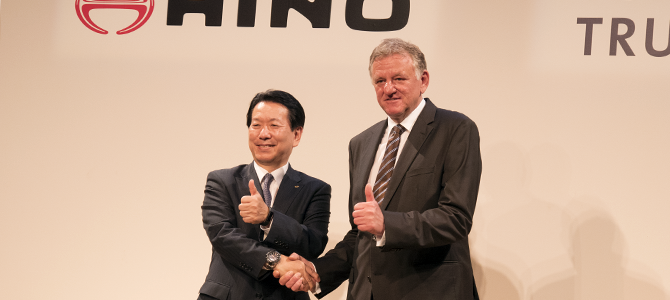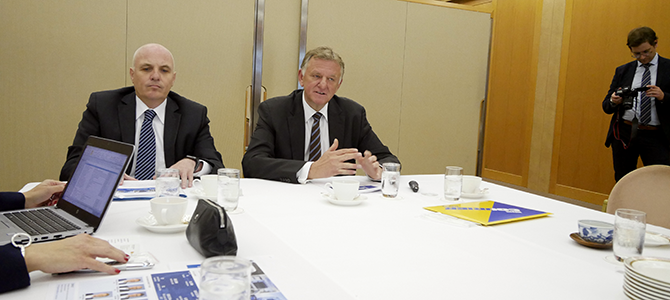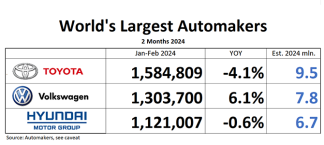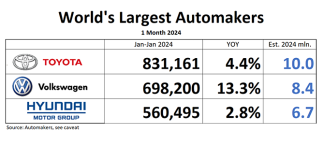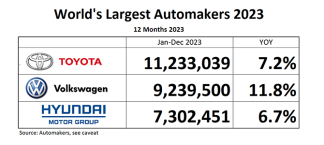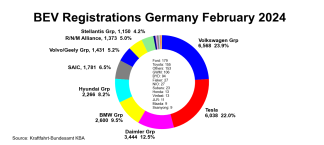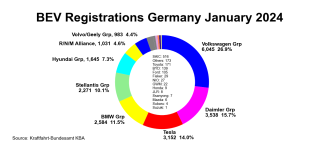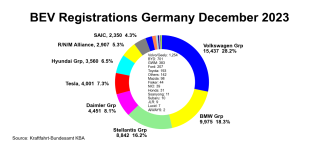Should you be among the people highly excited about Tesla’s prospects with heavy trucks, count yourself lucky that you weren’t in the ballroom of Tokyo’s Grand Prince Hotel this afternoon. Would you have been, you went home with all hopes abandoned. In said ballroom, two global players in the heavy truck business announced that they would join hands, because doing it alone is fraught with dangers. Unsaid, but quickly evident: Newcomers, don’t even try. Also, the allied bus and truck makers, will not bet on either battery electric or fuel cell. They will do both.
Surprisingly, bitter global competitors Toyota and Volkswagen signed a Strategic Cooperation Framework Agreement yesterday that “provides us with broad collaborative possibilities across technologies, products, and business regions,” Hino CEO Yoshi Shimo said today. Short of exchanging shares (yet) the two will cooperate across all facets of their business. “This alliance will seek broader opportunities,” Shimo said. Asked whether there could be cross share holdings, Renschler answered: “We have not talked about it, but I would not want to rule it out. We will see how it develops.”
Hino is a subsidiary of and majority owned by Toyota, and according to Shimo, “this relationship will not change.” Volkswagen Truck & Bus GmbH is a fully-owned subsidiary of Volkswagen Group, comprised of heavy bus and truck makers MAN, Scania and VW’s Brazilian heavy truck and bus offshoot Volkswagen Caminhões e Ônibus. In America, the company owns Navistar. Volkswagen’s big commercial vehicle operation in Germany is not part of the Truck & Bus GmbH, and hence not part of the alliance, but according to Volkswagen’s Hallway Radio, this could change any time if the likewise rumored big re-org happens that is said to divide Volkswagen into four groups, one of them trucks and buses of all sizes.
In Volkswagen, Hino has found “a partner that shares the same sense of crisis,” Shimo said. The global market of heavy trucks and buses is dominated by Daimler (owner of Freightliner, Thomas Built, and Western Star, and Fuso) and Volvo Trucks (owner of Mack Trucks, Renault Trucks, UD) while the huge Chinese market is a fiefdom of state-owned Dongfeng (which also has a JV with Volvo Trucks).
Truck makers are faced with heavy investments, spread across small unit numbers. Volkswagen Truck & Bus delivered a total of 206,600 units last year, while Hino produced 195,544 in the same year. In technological terms, the two companies also “are at a par,” as Shimo stated. The fact that two juggernauts think their future will be more assured if they join forces and develop, procure, build, and market together should be a warning to noobs who have never been in the heavy truck business. “The truck business and the car business are quite different,” Volkswagen’s Renschler warned.
Pressure on truck makers is high. “Autonomous driving, environmental footprint, and electrification are areas of technologies where trucks and buses probably adopt earlier than passenger cars,” Shimo said. “In order to realize that vision, we thought we need partners.” According to Renschler, Volkswagen Trucks&Bus “already sold autonomous trucks to customers, but of course we have to spend more money, and that’s the reason for such a strategic alliance: join forces, and spend R&D money only once instead of twice.”
The two parties are a great fit, we heard in a tete-a-tete with VW after the presser. “Hino is the strongest player in heavy duty, but seems to need new engines, which we are already developing,” said Matthias Gruendler, CFO of Volkswagen Truck & Bus. As far as markets go, Volkswagen is “very strong in Europe and Brazil, our Navistar is strong in U.S.A., and Hino is incredibly strong in South East Asia and Japan,” he said.
Asked whether fuel cells have been a topic in the discussions, Renschler told me that “indeed, we have talked about fuel cells. We have access to Hino’s technology and we will try using it.” Volkswagen Truck & Bus has electric buses, “and is about to deliver the first 10 battery-electric trucks in Austria,” said Renschler. “As far as fuel cells go, we had FC buses in Hamburg, but we switched back to battery electric, because they had big problems with frequent start stops. Maybe we have to combine fuel cell with battery.” Tesla truck fans, take note: Renschler said that sometimes, cities have a hard time charging electric buses overnight. He also said that truck owners abhor downtime.
A Toyota fuel cell engineer, quizzed after the meeting, suggested that Volkswagen may need to familiarize itself a bit more with the state of Toyota’s fuel cell art. Way back, Volkswagen used to develop high temperature fuel cells which are not suitable for start and stop, as I was told. Toyota’s fuel cells as used in the Mirai sedan and Hino buses can start and stop as frequently as hybrids, the engineer said.
One of the chief perils of alliances is “engineer pride,” said Renschler.
